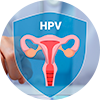We will beat cervical cancer

New chances for a healthy life: free vaccination against the human papillomavirus (HPV) for girls and boys from 11 to 14 years of age, introduction of the HPV test in regular gynecological check-ups for women 55+, collection of the HPV test by the practitioner by the patient herself. Revolutionary changes that could contribute to the fact that three hundred women do not die of cervical cancer every year and another eight hundred do not learn about this unfavorable diagnosis.
Cervical cancer is caused by a sexually transmitted infection with the human papillomavirus (HPV), which is involved
also on the development of other tumors in the genital area, in the mouth, neck and throat, causes genital warts. Prevention is lifelong sexual abstinence or monogamy, which is an unrealistic solution for the majority of the population. The positive information is that although up to 80 percent of people will encounter an HPV infection during their lifetime, it is mostly eliminated by the body's own immune system. Nevertheless, it is necessary to think about prevention, which in this case is easy and highly effective: vaccination.
Free vaccination of children gives higher chances of protection against disease
The possibilities of cervical cancer prevention can be significantly expanded thanks to several planned changes currently being discussed by the Ministry of Health of the Czech Republic. "Vaccination, together with preventive examination, is the best way to practically eradicate cancer caused by HPV viruses. I appeal to all those affected to get vaccinated and thus protect not only themselves, but also others. It's definitely worth it for a human life saved." stated the Minister of Health Prof. MD Vlastimil Válek, CSc., MBA, EBIR. From 2024, the age range for free vaccination with two doses of the human papillomavirus (HPV) vaccine is expected to be extended for both girls and boys between the ages of 11 and 14. "We have sufficient evidence to demonstrate the safety and extraordinary effectiveness of childhood vaccinations, and at the same time the creation of extraordinarily high levels of protective antibodies, which are expected to persist for a long time," oncogynecologist prof. MD Jiří Sláma, Ph.D. and adds: "This year's data indicate that the interest of parents to have their children vaccinated against HPV is increasing significantly, and the availability of free vaccination may further play a significant role in this."
